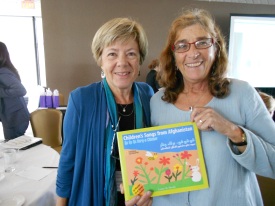By Melodie McCullough
Imagine a world without music; a home where a mother cannot hum to her baby; a house in which children’s toys that make sounds are banished; a place where applause is denied; a wedding without dancing; the public burning of musical instruments, audio and video cassettes, and televisions.
For a generation of Afghans, their country was silenced. Under the Taliban rule (and during the war years before) music was censored and intentionally eradicated — except for the singing of religious poetry and Taliban “chants”.
Why? Because the Taliban knew of its power and creative magic to bring people together, to unite them in their common cultural identity and instill pride in their homeland.

Left, Louise Pascale of the Afghan Children’s Songbook Project, with Joanne Rowland, of the Peterborough, Canada, chapter of Canadian Women for Women in Afghanistan
“When they took our music, they took our souls.”
Fortunately, with the help of many, such as Louise Pascale and Canadian Women for Women in Afghanistan (CW4WAfghan), the music is returning.
“When you lose the arts, those voices, you don’t know how to define yourself as individuals or as a country,” said Louise Pascale, project director of the Afghan Children’s Songbook Project, in Cambridge, Massachusetts, when she spoke at the annual general meeting of CW4WAfghan in Ottawa, Canada. “Music holds importance for all of us.”
Pascale, who has degrees in music and education, has been working since 2003 to re-introduce the stolen songs to Afghanistan’s children. Her story began in 1966 when she volunteered in Kabul, Afghanistan — “a peaceful, lovely country” — with the United States Peace Corps and worked with poets and musicians to gather traditional songs in the local languages and document them so they wouldn’t be lost. She created a children’s songbook to be distributed to the schools in Kabul, so children would have the gift of music from their culture.
Once she collected the songs, she traveled to schools and taught them to the children and had them draw pictures to go with each song. In 1968 the songbook, with the children’s illustrations, was published by the Kabul Press.
 Many years later, in 2003, Pascale found her worn and faded copy of the songbook in her bookcase back home in the United States. She realized, due to the war and oppression that has afflicted Afghanistan for over 30 years, that most likely her copy of the songbook was the only one left in existence.
Many years later, in 2003, Pascale found her worn and faded copy of the songbook in her bookcase back home in the United States. She realized, due to the war and oppression that has afflicted Afghanistan for over 30 years, that most likely her copy of the songbook was the only one left in existence.
“I stood in my living room, holding this book, and thought, ‘If these songs haven’t been sung in 10 years, maybe they’re being lost. They need to go back to Afghanistan’.”
At that point, she made a commitment to return the songs, now almost completely lost from the culture, back to the children of Afghanistan. It was at that moment that the Songbook Project was born.
After contacting hundreds of individuals and organizations, Pascale was fortunate to be introduced to a well-known and respected Afghan musician from Toronto, Vaheed Kaacemy. He recognized the value and need for such a project and was willing to work with Afghan children to record the songs. After hours of work, researching, arranging and rehearsing, he recorded 16 songs, in Farsi, Pushto, Uzbeki and Hazara. Eight of the songs are from the original songbook. The others were collected and/or composed by Mr. Kaacemy.

Girls from Kunduz performing Salaam, Salaam – a Hazaragi song
CW4WAfghan has awarded three grants of $10,000 each to support the Afghan Children’s Songbook Project.
Fifty thousand copies of the songbook, Qu Qu Qu Barg-e-Chinaar: Children’s Songs from Afghanistan have now been distributed to pre-schools, elementary schools and orphanages, and women’s and family centres to strengthen cultural ties, preserve these traditional songs and enhance basic literacy across Afghanistan.
The songbook includes a 60-minute CD and a cassette tape of 16 songs, with an accompanying booklet with the lyrics and original children’s drawings. It has been used both to introduce children to the vibrant music of Afghanistan and also as a basic literacy text. The songbook is printed with bright colorful illustrations and easy-to-read text, making it fun for children to listen to the CD and read along. Also, 7,500 teachers’ guides have been distributed.
The next part of the project is to collect the traditional folk tales of Afghanistan.
“My dream for Afghanistan is that we will see it a peaceful country like it was in the 1960s,” said Pascale, “with opportunities for children to have an exciting, deep learning experience that will make them better humans. Hold your music dear. Pass it on to your family.”
Afghanistan National Institute of Music launched “I am a Girl”, a song to inspire and empower Afghan girls, marking Girl’s International Day, 2016.
Categories: Afghanistan, Education, Music, Uncategorized, Youth